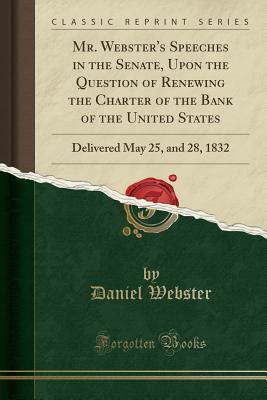Mr. Webster's Speeches in the Senate, Upon the Question of Renewing the Charter of the Bank of the United States: Delivered May 25, and 28, 1832 (Classic Reprint)
by Daniel Webster
Excerpt from Mr. Webster's Speeches in the Senate, Upon the Question of Renewing the Charter of the Bank of the United States: Delivered May 25, and 28, 1832
I have thought this suiject, Mr. President, of so much importance, as that it was fit to present it, at this time, to the consideration of the Senate. I propose to do no more, at present, than to insert such a provmon as I have described in this bill; in the mean time, I hope the mattenmay attract the at tention of those whose agency will be desired to accomplish the general ob Jcet.
About the Publisher
Forgotten Books publishes hundreds of thousands of rare and classic books. Find more at www.forgottenbooks.comwww.forgottenbooks.com
This book is a reproduction of an important historical work. Forgotten Books uses state-of-the-art technology to digitally reconstruct the work, preserving the original format whilst repairing imperfections present in the aged copy. In rare cases, an imperfection in the original, such as a blemish or missing page, may be replicated in our edition. We do, however, repair the vast majority of imperfections successfully; any imperfections that remain are intentionally left to preserve the state of such historical works.
I have thought this suiject, Mr. President, of so much importance, as that it was fit to present it, at this time, to the consideration of the Senate. I propose to do no more, at present, than to insert such a provmon as I have described in this bill; in the mean time, I hope the mattenmay attract the at tention of those whose agency will be desired to accomplish the general ob Jcet.
About the Publisher
Forgotten Books publishes hundreds of thousands of rare and classic books. Find more at www.forgottenbooks.comwww.forgottenbooks.com
This book is a reproduction of an important historical work. Forgotten Books uses state-of-the-art technology to digitally reconstruct the work, preserving the original format whilst repairing imperfections present in the aged copy. In rare cases, an imperfection in the original, such as a blemish or missing page, may be replicated in our edition. We do, however, repair the vast majority of imperfections successfully; any imperfections that remain are intentionally left to preserve the state of such historical works.
BUY NOW
Paperback, 20 pages
Published January 2nd 2019 by Forgotten Books
© 2025 Bibleportal.com 版权所有.

Daniel Webster was a leading American statesman during the nation's Antebellum Period. He first rose to regional prominence through his defense of New England shipping interests. His increasingly nationalistic views and the effectiveness with which he articulated them led Webster to become one of the most famous orators and influential Whig leaders of the Second Party System.
Daniel Webster was an attorney, and served as legal counsel in several cases that established important constitutional precedents that bolstered the authority of the Federal government. As Secretary of State, he negotiated the Webster-Ashburton Treaty that established the definitive eastern border between the United States and Canada.
Webster tried three times to achieve the Presidency; all three bids failed, the final one in part because of his compromises. Similarly, Webster's efforts to steer the nation away from civil war toward a definite peace ultimately proved futile. Despite this, Webster came to be esteemed for these efforts and was officially named by the U.S. Senate in 1957 as one of its five most outstanding members.
... Show more